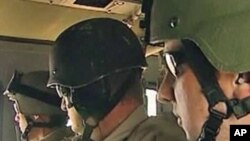President Barack Obama’s decision to withdraw U.S. troops from Afghanistan more quickly than expected reverberated Thursday in Europe, where many governments and some citizens also are eager to see their involvement in the nearly 10-year-old war come to an end.
The president’s announcement was not front page news in most British newspapers, but one that did cover the decision called it a gamble and a retreat.
On a visit to Afghanistan, British Foreign Secretary William Hague said the president’s decision is in line with British government thinking, and with its plan to withdraw 400 of its nearly 10,000 troops by February, and likely more after that.
“We will continue to assess the number of British forces required, based on the condition on the ground, but of course leading to a point by 2015 where we will not have combat troops fighting in Afghanistan or in anything like the numbers they are today," said Hague.
In Brussels, NATO Secretary General Anders Fogh Rasmussen welcomed President Obama’s decision.
“The United States took the bold decision to increase the number of American troops in Afghanistan by 30,000," said Fogh Rasmussen. "Other allies and partners stepped up and provided an additional 10,000 troops, and together those troops were part of an international effort to turn the tide in Afghanistan. And now the tide is turning.”
At London’s International Institute for Strategic Studies, retired British Brigadier Ben Barry said European countries are likely to follow the U.S. lead.
“Of course there is a danger that not only will they match the U.S. drawdown timetable, but they might exceed it," said Barry.
Barry says that could embolden Taliban fighters, and top U.S. military officers would have preferred to keep more troops in Afghanistan for a longer period.
“[And] if you decide to go against military advice, what you want to be absolutely certain of is that the rest of the government is pulling together to maximize the chance of the success of the strategy," he said.
Just outside the Institute, at a busy Underground Station, people passing by were generally glad to hear British troops might also be coming home relatively soon. But they were also concerned about finishing the job in Afghanistan.
"One needs to be ready to hand over," said a man. "You can’t hand over something that is still an absolute mess, can you?"
Reporter: "So you think the Afghan mission is still worth pursuing a while longer?"
"They've got to get it right before they hand it over," answered the man.
"You get out and leave it a mess doesn't seem right, either," said a woman. "So, it has to be done gradually and it has to be done sensitively."
"It has to be balance between the number of troops they withdraw and pull back, set against continuing their presence in Aghanistan to finish what they started," said another person.
The first U.S. troops are scheduled to leave Afghanistan next month, with all 33,000 surge troops sent there in 2009 out by next September.




